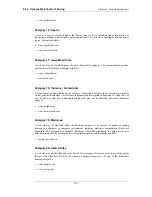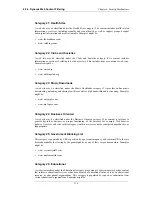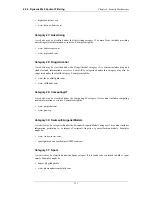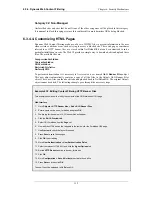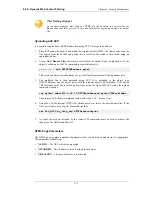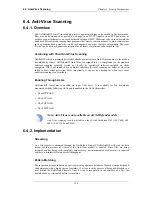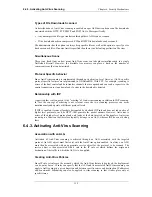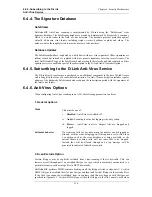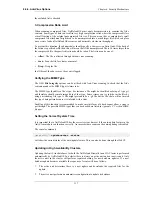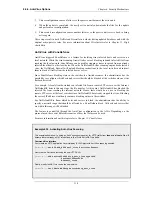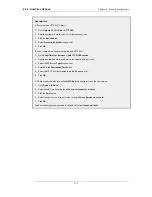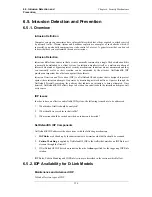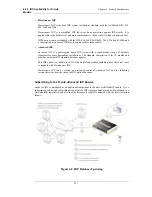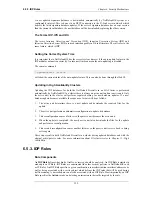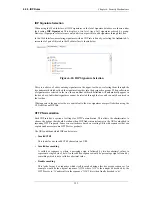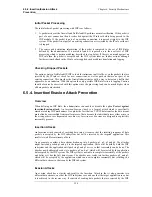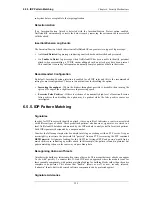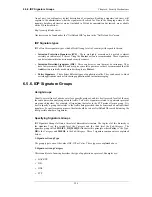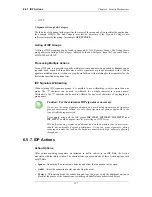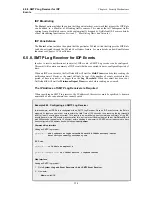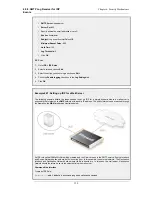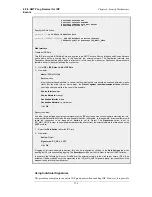
Types of File Downloads Scanned
As described above, Anti-Virus scanning is enabled on a per ALG basis and can scan file downloads
associated with the HTTP, FTP, SMTP and POP3 ALGs. More specifically:
•
Any uncompressed file type transferred through these ALGs can be scanned.
•
If the download has been compressed, ZIP and GZIP file downloads can be scanned.
The administrator has the option to always drop specific files as well as the option to specify a size
limit on scanned files. If no size limit is specified then there is no default upper limit on file sizes.
Simultaneous Scans
There is no fixed limit on how many Anti-Virus scans can take place simultaneously in a single
NetDefend Firewall. However, the available free memory can place a limit on the number of
concurrent scans that can be initiated.
Protocol Specific behavior
Since Anti-Virus scanning is implemented through an Application Level Gateway (ALG), specific
protocol specific features are implemented in NetDefendOS. With FTP, for example, scanning is
aware of the dual control and data transfer channels that are opened and can send a request via the
control connection to stop a download if a virus in the download is detected.
Relationship with IDP
A question that is often posed is the "ordering" of Anti-virus scanning in relation to IDP scanning.
In fact, the concept of ordering is not relevant since the two scanning processes can occur
simultaneously and operate at different protocol levels.
If IDP is enabled, it scans all packets designated by a defined IDP rule and does not take notice of
higher level protocols, such as HTTP, that generate the packet streams. However, Anti-virus is
aware of the higher level protocol and only looks at the data involved in file transfers. Anti-virus
scanning is a function that therefore logically belongs in an ALG, whereas IDP does not belong
there.
6.4.3. Activating Anti-Virus Scanning
Association with an ALG
Activation of Anti-Virus scanning is achieved through an ALG associated with the targeted
protocol. An ALG object must first exist with the Anti-Virus option enabled. As always, an ALG
must then be associated with an appropriate service object for the protocol to be scanned. The
service object is then associated with a rule in the IP rule set which defines the origin and
destination of the traffic to which the ALG is to be applied.
Creating Anti-Virus Policies
Since IP rule set rules are the means by which the Anti-Virus feature is deployed, the deployment
can be policy based. IP rules can specify that the ALG and its associated Anti-Virus scanning can
apply to traffic going in a given direction and between specific source and destination IP addresses
and/or networks. Scheduling can also be applied to virus scanning so that it takes place only at
specific times.
6.4.3. Activating Anti-Virus Scanning
Chapter 6. Security Mechanisms
315
Summary of Contents for DFL-1600 - Security Appliance
Page 27: ...1 3 NetDefendOS State Engine Packet Flow Chapter 1 NetDefendOS Overview 27 ...
Page 79: ...2 7 3 Restore to Factory Defaults Chapter 2 Management and Maintenance 79 ...
Page 146: ...3 9 DNS Chapter 3 Fundamentals 146 ...
Page 227: ...4 7 5 Advanced Settings for Transparent Mode Chapter 4 Routing 227 ...
Page 241: ...5 4 IP Pools Chapter 5 DHCP Services 241 ...
Page 339: ...6 7 Blacklisting Hosts and Networks Chapter 6 Security Mechanisms 339 ...
Page 360: ...7 4 7 SAT and FwdFast Rules Chapter 7 Address Translation 360 ...
Page 382: ...8 3 Customizing HTML Pages Chapter 8 User Authentication 382 ...
Page 386: ... The TLS ALG 9 1 5 The TLS Alternative for VPN Chapter 9 VPN 386 ...
Page 439: ...Figure 9 3 PPTP Client Usage 9 5 4 PPTP L2TP Clients Chapter 9 VPN 439 ...
Page 450: ...9 7 6 Specific Symptoms Chapter 9 VPN 450 ...
Page 488: ...10 4 6 Setting Up SLB_SAT Rules Chapter 10 Traffic Management 488 ...
Page 503: ...11 6 HA Advanced Settings Chapter 11 High Availability 503 ...
Page 510: ...12 3 5 Limitations Chapter 12 ZoneDefense 510 ...
Page 533: ...13 9 Miscellaneous Settings Chapter 13 Advanced Settings 533 ...









